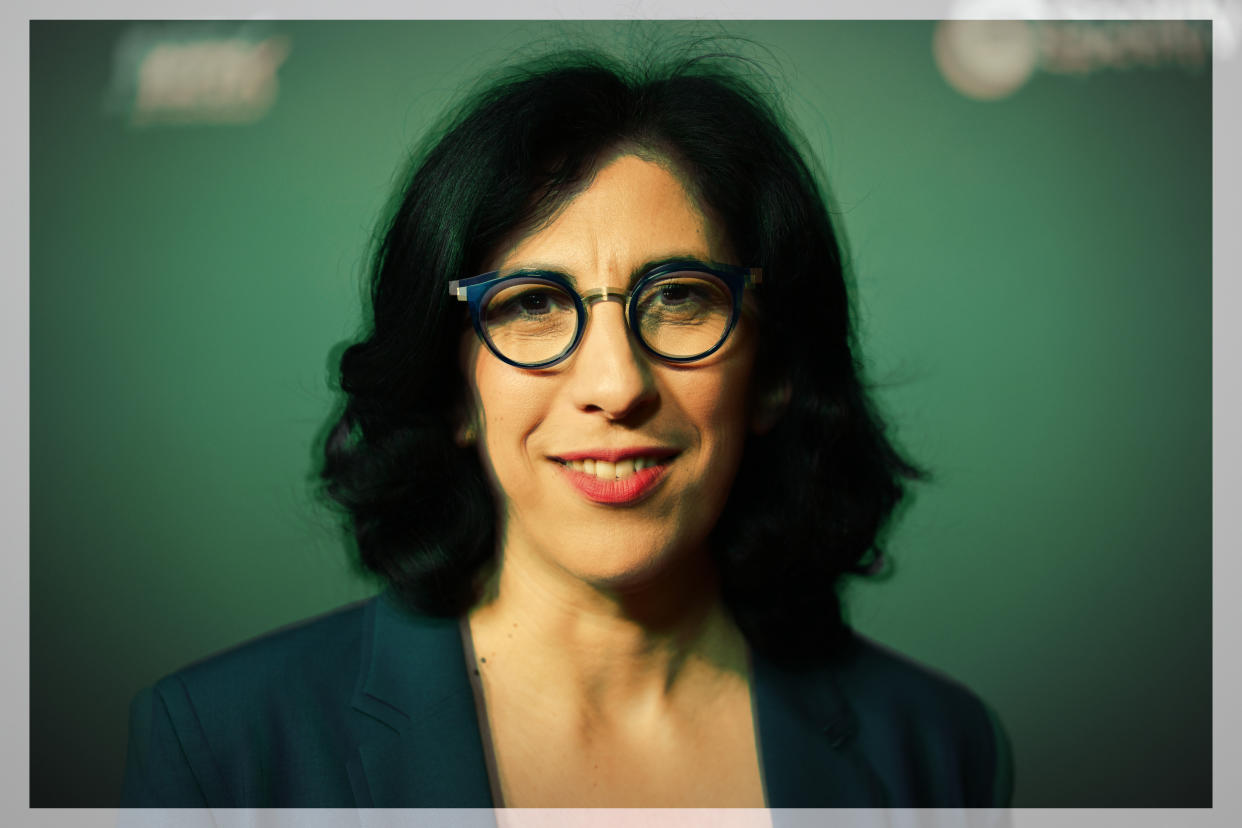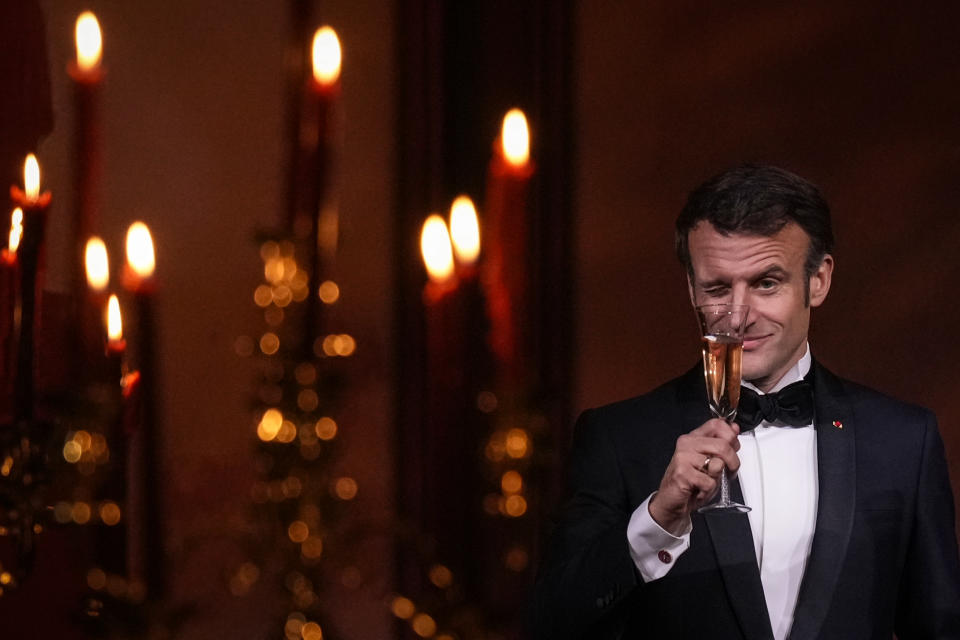France’s Ministry of Culture Is a Model Example of How the Government Can Support the Movies

- Oops!Something went wrong.Please try again later.
Kohn’s Corner is a weekly column about the challenges and opportunities of sustaining American film culture.
This week, French minster of culture Rima Abdul-Malak came to Cannes, where she announced a new program to invest $350 million in the film and TV sector over the next seven years. The initiative is part of the larger “France 2030” initiative unveiled by president Emmanuel Macron last fall, and will go toward the support of production studios and inclusive training programs throughout the country. When I sat down with Abdul-Malak at the Unifrance terrance at Cannes over the weekend, even she sounded stunned by the extent of the plan.
More from IndieWire
The Plot Details of 'The Idol' Are as Wild as Everyone Expected -- and Then Some
'The Idol' First Reactions: A 'Pornhub-Homepage Odyssey,' 'Prepare Yourself for Quite the Discourse'
“I don’t know when I will be able to announce a budget like that again,” she said.
It’s an extraordinary figure, especially for Americans. Not because the number is so large — $350 million might not cover the budget of “Fast X” — but because it’s a testament to the government’s real-world support of film and TV.
I first encountered Abdul-Malak at a Cannes screening last year, days after Macron swore her into the position, where she dictates everything from the board to the budget. The 44-year-old former mayoral assistant and New York embassy staffer wasn’t prepared to do interviews at the time, but she agreed this year to sit down with me and a handful of European journalists this weekend. It was, I’m told, the first time a cultural minister has given an international interview at Cannes.
I started with a simple question: We don’t have a cultural minister in the U.S. — “I know,” she said, with a chuckle — so can you explain why it’s important for the government to invest in the future of cinema?
“My predecessor used to say that cinema is an art and an industry,” she said, referring to the first Minister of Culture, André Malreaux. “For those reasons, it’s important to have a public policy to support the industry and innovation in the arts. This is how France has always considered the role of the ministry of culture — not as controlling art, but bringing all the conditions you need to have so that they can take risks, innovate, and freely create.”
Cannes was an extension of that, she added. “The history of Cannes is also very political,” she said. “Cannes was created in response to fascism and what was happening in Italy [during WWII]. It’s the festival where we want freedom to be reflected.”
Sit with that for a moment. It’s hard — impossible? — to imagine those statements coming from a presidential appointment who serves as an employee of the American government. In the United States, cultural initiatives tend to fall to the Secretary of the Interior and the Assistant Secretary of State for Educational and Cultural Affairs, but creative endeavors usually come second to other public policy issues. Making the rounds at Sundance is not part of their mandate. Meanwhile, the National Endowment for the Arts awards modest grants to small institutions, but nothing on the scale of what France can do.
“In the U.S., I feel it has always been the reverse way of thinking — like, if we give this sector public subsidies, in a way, they would lose their independence,” Abdul-Malak said. “The U.S. is also much more federal than France. It’s a much more centralized country, historically. [In France] if we invest in infrastructure, schools, venues like performing arts centers, movie theaters, concert halls, etc., we’re creating the conditions for cultural life to be as vibrant as possible. We’re creating the conditions for art to be as free as possible.”
Abdul-Malak knows there’s no guarantees on that $350 million investment. “You can never predict what will be a good movie and what won’t be,” she said. “It’s like science. You need to support research and experimentation. Something will pop up. New forms, new artists, new stories. It will surprise us.”
That said, it’s not all paix, amour, et harmonie. France is facing many of the same right-wing political factions that shape American politics and Abdul-Malak expressed the fear that extremists are gunning for France’s cultural initiatives. “Today everything you do in the cultural sector is actually political,” she said. “We have a far right that is targeting exhibitions, performances … They have spoken at the Parliament to suggest that our support for cinema should be linked to only films that promote French history.”
France is currently in the midst of nationwide protests over Macron’s decision to raise the retirement age from 62 to 64. A few weeks before the festival, the electricians union even threatened to turn off the lights in Cannes to protest the pension plan. “Our common enemy should be the far right and we shouldn’t be threatening a festival like Cannes by cutting electricity,” Abdul-Malak. However, she accepted some measure of turmoil would always be a part of the process. “When you support a festival like this, you don’t support it because people love you,” she said. “Emmanuel Macron is always booed somewhere. I have also had my moments.”
Over the course of an hour, Abdul-Malak held court on many other potent subjects. Here’s a crash course on the many of the hurdles that a cultural attaché must face, especially when the future of the arts are at stake.
The Netflix Problem
The Cannes policy requiring a French theatrical release for all competition films means Netflix still doesn’t play movies at the festival, because French law requires a 15-month gap between theatrical and streaming. (Parliament lowered that from an earlier three-year requirement.) The streamer would rather serve its subscribers than get a red-carpet premiere and wait over a year to stream a movie.
Abdul-Malak said she would like to further reduce the 15-month window. “It has to be condensed,” she said. “My feeling is that the platforms are more and more understanding the value of theaters and they need them. Then the question is in what time, and the timeframe is maybe too far.”

She praised Apple for partnering with Paramount on “Killers of the Flower Moon,” which opens this fall after its Cannes launch. “They know there’s a value created there,” she said. “So let’s be positive and not look at that as an obstacle but as a value.”
Netflix, meanwhile, has agreed to finance $200 million per year in French productions. With time, it is likely to outpace major European broadcast and streaming giant Canal Plus with its investments. “But that’s not the case right now,” Abdul-Malak said. “We need to preserve our network of theaters. We have 2,000 theaters in France in many, many cities and French people are very much attached to this network.” French theatrical admissions in April were three percent higher than pre-COVID figures in 2019.
No Diversity Quotas
While Hollywood tries to diversify its products and the Academy creates inclusivity mandates for Best Picture, Abdul-Malak said France would never consider such a path. “This won’t work in France because we are against ethnic statistics,” she said. “Also, diversity is not only a question of skin color. It’s a question of geography. That’s why we have projects in the West Indies. It’s also about social diversity. You can be in a very rural area and be white and as far from this industry as someone in the north quarter of Marseilles … it has to be this multi-diversity approach.”
She noted her personal feelings on the subject as a Lebanese-born woman whose family immigrated to France in her childhood. “I’m Lebanese, but I don’t want to be labeled as Arabic because I feel our identity is much more multiple than that,” she said. “Diversity is a social question. It’s not only an ethnic question. People can be white and be poor and be a priority for us in this program.”
This may sound rough on progressive American ears, but Abdul-Malak said that mentality is itself part of the problem. “We can’t do this by having to create categories of colors of skin and then putting people in these categories,” she said. “This, I think, is a very dangerous thing. Identity is not that.”
Oscars Are Not a Priority

France, which hasn’t won an Oscar since “Indochine” in 1992, has long faced criticism for its submission process. For years, former submission committee member and Cannes director Thierry Fremaux wielded enough influence to force Cannes movies into shortlist consideration. (As much as I adored “Titane,” it wasn’t destined for Oscar glory.)
Last year, Abdul-Malak revised the committee to ensure that it included a range of industry influencers and would change on a regular basis. That process will soon be revised again, now that the Academy has announced requirements that 50 percent of all international committees be comprised of filmmakers or craftspeople.
When asked about the importance of this process, Abdul-Malak seemed to echo Fremaux’s recurring assertion that the Oscars should focus on American movies. “I don’t decide what the film is,” she said. “But the Oscar competition is really a lobbying competition. You need to invest in this lobbying strategy.” And they have other priorities.
Work With the World
France has 50 international co-production agreements and these partnerships are seen throughout the Cannes lineup. Abdul-Malak has been meeting with many of the filmmakers benefiting from such work, including French-Senegalese director Ramata-Toulaye Sy, whose poetic romance “Banel & Adama” is the only first feature in Cannes competition. These projects generally require some aspects of the production to take place in France. “We have beautiful landscapes, beautiful cities, but more and more productions happening in studios [elsewhere],” she said. “We need to bring them back to France.” The country provides up to 40 percent tax credit on domestic productions.
Education Is Everything
Abdul-Malak said the France 2030 initiative was a direct response to the concerns over the retirement age, particularly with respect to creative professions like filmmaking and related arts. “I think the real debate should be now about training in the arts sector there are so many segments where you need to work on a reorientation of your life at an age way before 64,” she said. “It’s about creating opportunities for the sector in 10 or 20 years to have more jobs for different ages. This is also a way to anticipate how many jobs we can create.” Many of the studios opened under the new proposal will be located close to educational institutions. “It means during their training, students can go work on a film,” she said. “It renews creativity through training.”
#MeToo Was the Start, But Not the End, of Cultural Change
“MeToo started with cinema,” she said, in an oblique reference to Harvey Weinstein. “There is still a lot of progress to be made. I am well aware of that. There are more women directors at Cannes, but we are far from parity, for example. We also see the budgets of films, when directed by women, has been less than when it is not directed by a woman. There is still so much to be done. But I prefer to see how far we have come and the collective will that is in place, because I am optimistic about life.”

She added that filmmaking itself could contribute to the discourse and cited the recent French release “All Your Faces,” which focuses on France’s Restorative Justice program. “Cinema pushes, works on, and transmits so many social issues with humanity and sensitivity,” she said. “I expect the industry to move the lines on these subjects as it knows how to do — with imagination.”
She added that France faces many battles in the years to come as more far-right political candidates emerged. “So what will happen in three years with the local elections, the European elections, the presidential election in 2027?” she asked. “This is a huge, huge concern. Culture is already a political issue. It’s not just pleasure and films.”
As usual, I welcome feedback to this column: eric@indiewire.com.
Readers attending Cannes this year are invited to attend a live recording of our Screen Talk podcast at the American Pavilion this Tuesday, May 23, at 2:30 p.m. Reach out to me via Twitter if you need help with access.
Best of IndieWire
Where to Watch This Week's New Movies, from 'Fast X' to 'Master Gardener'
Every Palme d'Or Winner from the Cannes Film Festival, Ranked
Sign up for Indiewire's Newsletter. For the latest news, follow us on Facebook, Twitter, and Instagram.

